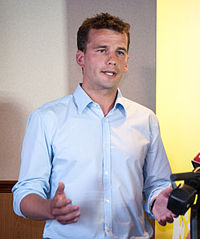ACT New Zealand
| ACT New Zealand | |
|---|---|

|
|

|
|
| Party leader |
David Seymour President Tim Jago |
| Deputy Chairman | Beth Houlbrooke |
| Emergence | Founders: Roger Douglas and Derek Quigley |
| founding | 1994 |
| Headquarters |
27 Gillies Avenue Newmarket Auckland |
| Youth organization | Young ACT |
| Alignment |
Classical liberalism , right-wing libertarianism |
| Colours) | Yellow and blue |
| House of Representatives |
1/120 |
| Website | www.act.org.nz |
ACT New Zealand is one of the political spectrum in New Zealand right being moved party. The party was founded in 1994 and has beenrepresentedin the House of Representatives without interruption since 1996. The party stands for individual freedom, less government intervention, and the reward of hard work.
history
The origins of the Act New Zealand party go back to the Association of Consumers and Taxpayers lobbying organization . In both cases , the driving force behind the founding of the Association and later the party was Roger Douglas , who had to resign as Finance Minister of the Labor government in November 1988 because of his free- market economic and financial policy - also known as rogernomics - but not back in July 1990 Ran parliamentary elections and later left the Labor Party .
In 1993 Douglas founded the Association of Consumers and Taxpayers together with Derek Quigley , a former Minister of the National Party , from which the ACT New Zealand party emerged in 1995 . Douglas came up with the idea of founding the Association in mid-1991 after meeting activists from the Backbone Club , a group within the Labor Party . The formation of the Association took shape in 1992 after Douglas traveled to Canada and had contact with the Canadian Taxpayers Federation . So he formed the Association of Consumers and Taxpayers based on the Canadian organization.
After New Zealand changed its electoral system based on the German electoral system to Mixed Member Proportional ( MMP ) in 1994 and thus gave small parties a better chance compared to the previous majority voting system, the Association of Consumers and Taxpayers decided to go under the name ACT New Zealand ( ACT ) to establish. ACT entered the General Election (national parliamentary election) for the first time in 1996 and won eight parliamentary seats from scratch, and in the 1999 election it became nine.
Parliamentary elections
| General Election | Share of votes | Direct mandates | Mandates via list | Total seats |
|---|---|---|---|---|
| 1996 | 6.1% | 1 | 7th | 8th |
| 1999 | 7.0% | 0 | 9 | 9 |
| 2002 | 7.1% | 0 | 9 | 9 |
| 2005 | 1.5% | 1 | 1 | 2 |
| 2008 | 3.6% | 1 | 4th | 5 |
| 2011 | 1.1% | 1 | 0 | 1 |
| 2014 | 0.7% | 1 | 0 | 1 |
| 2017 | 0.3% | 1 | 0 | 1 |
Sources: Election New Zealand
See also
Web links
- Official homepage. ACT New Zealand , accessed November 20, 2011 .
Individual evidence
- ↑ Jennifer Curtin, Raymond Miller : Story: Political parties - External links and sources . Te Ara - the Encyclopedia of New Zealand , accessed November 20, 2011 .
- ↑ a b c General elections 1996-2005 - seats won by party . Election New Zealand , September 9, 2013, accessed February 5, 2016 .
- ↑ a b 2008 General Election Official Result - Overall Status . Election New Zealand , November 22, 2008, accessed February 5, 2016 .
- ^ Parliamentary parties - ACT New Zealand . New Zealand Parliament , accessed November 20, 2011 .
- ^ Act Party history - Formation of a pressure group . Liberation by Bryce Edwards , accessed November 20, 2011 .
- ↑ 2017 General Election - Official Result. NZ electoral commission, October 2017, accessed on October 22, 2017 (English).